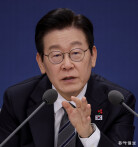[Editorial] Mixed Signals Confuse Market
[Editorial] Mixed Signals Confuse Market
Posted March. 27, 2008 08:13,
Strategy and Finance Minister Kang Man-soo said yesterday, Recent reports that the government will put controlling inflation over pursuing economic growth are not true. His announcement is completely different from the presidents comment, which said, Stabilize rising consumer prices is more urgent than pursuing economic growth, which implied that the government will put priority on easing inflation. The stunning gap between the presidents understanding of economic conditions and finance ministers interpretation of economic developments has rattled the domestic financial market. Even businesses complain that they have no idea whose words to believe.
Worse, Bank of Korea Governor Lee Seong-tae has aggravated the situation by saying, The won-dollar exchange rate has soared to 1,030 won. From a short-term perspective, it seems that the exchange rate wants to find where its highest level is. The market took his comment to mean that the rate had peaked and that it would soon fall. As a result, the rate fell more than 20 won, the biggest drop in nearly seven years. Kang, however, then made a statement that seemed to imply that he wants the exchange rate to rise further. If economic and financial authorities send mixed signals to the market, businesses and investors will face a heavy burden.
Since Koreas economic fundamentals have weakened over the lost decade of liberal rule, the nation apparently cannot choose between job creation via economic growth and stabilizing consumer prices, which directly affects the lower-income bracket. Kang says the governments failure to choose between growth of seven percent and controlling consumer prices shouldnt be considered wrong. But government comments should address economic conditions and policies considering how they can affect the public and business.
Kang and Governor Lee, however, are apparently jockeying for leadership of interest rate and foreign exchange policies instead of teaming up to stabilize the suffering financial market. Since the new government took power, the won has weakened against the dollar despite other major currencies strengthening against greenback and the Korean stock market has tumbled. Partly to blame for this is economic policy-makers, who have made rash statements instead of cooperating to introduce effective measures.






